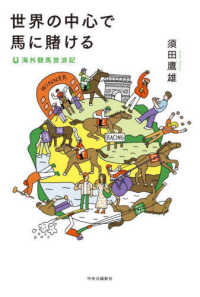- ホーム
- > 洋書
- > ドイツ書
- > Mathematics, Sciences & Technology
- > Earth Science
Description
This textbook discusses the problems of agriculture and food systems globally and regionally using agroecology as the lens, with the goal of teaching the processes and techniques for understanding and re-evaluating rural landscapes (ecosystems) and farming systems. It clearly delivers the pedagogy of agroecology teaching and methodology for agroecology studies by the authors from worldwide experience, using experiential learning and action education of agroecology at the graduate education level. In 10 chapters, the book offers a concise but informative guide covering the interconnected ways that agroecology can inform and lead international strategies and local actions to address interwoven critical challenges, namely climate change, fresh water availability, and food insecurity.
Chapter 1: Agroecology and the New Four Horsemen of the Apocalypse.- Chapter 2: The what , how and why of agriculture and agroecology.- Chapter 3: Agroecosystems and their services.- Chapter 4: Agricultural Biodiversity and Food Security.- Chapter 5: Agroecology and agri-food system transformation.- Chapter 6: Integrating rural landscape sustainability into Agroecology.- Chapter 7: New challenges for education in agroecology.- Chapter 8: Systematic and participatory action research in agroecology.- Chapter 9: Agroecology for food sovereignty: a science, a practice and a social movement.- Chapter 10: Eco-agriculture: adapting to global climate change by applying agroecology.
Dr. Songliang Wang is a professor of Fujian Agriculture and Forestry University (FAFU) in China, who has been teaching Agroecology for undergraduates since 1990 and initiated an Advanced Agroecology course for both Chinese and international postgraduates majoring in agriculture and agronomy since 2013. Dr. Wang has been a teaching partner of Dr. Claude Caldwell for Sino-Canadian 2+2 educational program since 2004. Together they have published 3 textbooks named Agroecology in English since 2012 and more than 10 papers relating to agroecology teaching and research since 2009. Dr. Wang is an editorial member of the International Journal of Agricultural Sustainability . Since 2019 he initiated the grassroot professor plan to expand his classroom to rural field, including to bring university students who were learning agroecology course to field, and co-learning agroecology and eco-agriculture with new farmers in rural area, in order to fuel and facilitate agroecological transformation in Fujian province, Under his efforts, a group of agroecology experts were trained and several county scale eco-agriculture bases were established in Fujian province.
Dr. Claude D. Caldwell is a professor emeritus from Dalhousie University, who initiated an agricultural ecosystem course for all freshmen undergraduates in Nova Scotia Agricultural College in the early 1990s. He conceived a new understanding of agriculture in 1996, i.e. Agriculture is the science, art, politics and sociology of changing sunlight into happy, healthy people, which closely mirrors todays agriculture and food system transition. Dr. Caldwell was a co-founder of Sino-Canadian 2+2 educational program in 2003, and co-taught agroecology for the programmed students with Dr. Wang from 2004 to 2024. He has been active in international development work since 1995 and worked in 11 different countries over the past 28 years He has taught and/or developed undergraduate and graduate curriculum in co-operation with universities in Jamaica, Trinidad, The Philippines, Indonesia, Vietnam, The Gambia, Tanzania, Cambodia, Ethiopia, Uganda and China. He continues to be active in teaching and research with international colleagues, especially in China.







